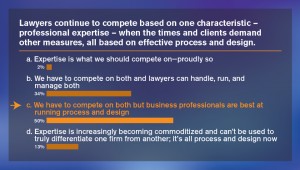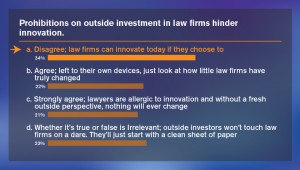But second, and for my money far more importantly, those who think the fundamental premise of the partnership model cannot support investment outnumber those who think it can by 2:1. Truth be told, I think this cohort has the better of the argument.
So, if you agree that investment is needed (90%) and that our structure can’t support it (2 out of 3), we have some serious self-examination in our future.
The big news here is that 85% think we have to compete on legal expertise and effective business process management and design. Barely 2% think expertise alone cuts it any more, while 13% think optimized process alone will win the day. Think about that for a second: Although the absolute numbers are small, when asked choosing between expertise and process as “absolutes,” process trumps expertise by a ratio of 6:1. Imagine forecasting that result five years ago; I would not, I confess, have had the perspicacity to do so.
Whether the business process expertise should be managed by lawyers (41% of those who think expertise and process both matter) or by businesspeople (59%) means that by a ratio of 3:2 we already are at the point of accepting that businesspeople can do some things better than lawyers. Since when has anyone been able to do anything better than lawyers?
And here’s a prediction: that ratio will top 90% in three to five years. C-suite professionals should be running business operations—and getting the respect and compensation they deserve—and lawyers should be serving their clients. I ask you, folks, what on earth is so hard about this Management 101 premise?
Breaking this down, about one-third think law firms can innovate if they so choose, over 40% think it’s not going to happen under any circumstances, and the final one-fourth think outside investors won’t touch us because our business model is so perverse.





What are the attributes of the respondents to the survey (profession, role, years of professional experience, age, gender, jurisdiction)? And how many respondents responded to each question? Because this is a convenience sample with some missing data we need to know this information in order to understand the relevance of the responses.
Here’s an example of a captive LPO led by a non-lawyer: http://www.legalweek.com/legal-week/news/2254737/addleshaws-eyes-flexiworing-push-as-lowcost-base-grows-with-new-hires (in the second half of the report). Keep watching and we will see whether it is the exception. (I suspect that your point about culture may be slightly less relevant in some UK law firms, but I may be wrong.)
So much of what ails big law is a direct result of up or out. Up or out by design means that the people who handle important, expensive and very profitable assignments like large e-discovery projects are ‘promoted’ out of running those projects as soon as they have had some experience. No wonder the LPOs are eating so much of that work – they hire professionals to handle the job and keep them there. Promotion typically means more responsibility to handle the same kind of work. Thus they do and likely always will have an efficiency advantage (regardless of billing rates) because these ‘junior associate’ projects are treated as core competencies instead of training exercises.
Big law recruiting plays a key role here too. It is expensive, and as you have recently covered not very effective. High attrition coupled with expensive recruiting should indicate a real problem to be solved, it certainly does to business people who aren’t lawyers. If big law can move from its current high attrition/lots of first year hiring/up or out system to one with lower attrition/first year or lateral hiring as needed/up based on merit, out based on performance in position or business needs… much money could be saved and value provided to clients would be much improved.